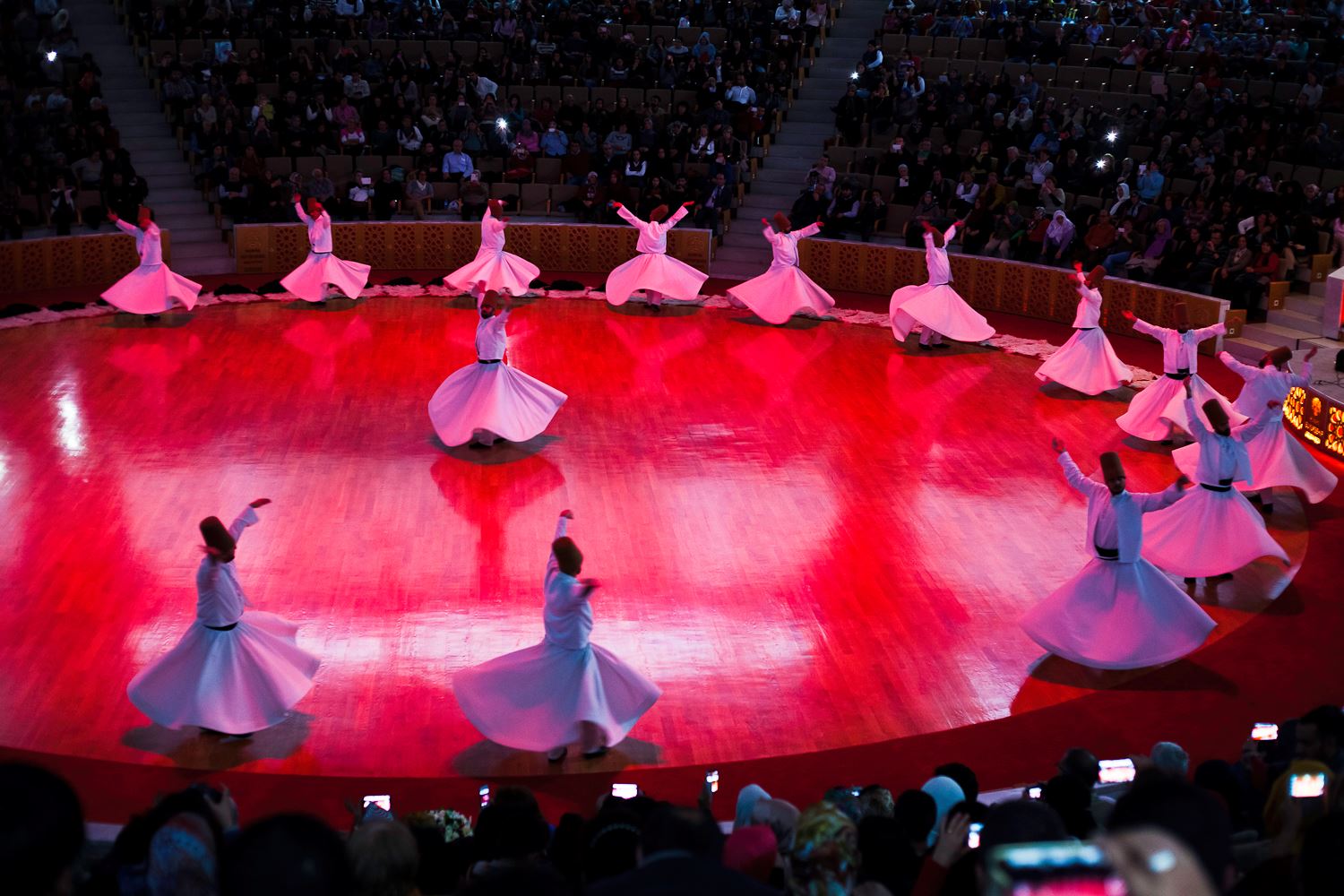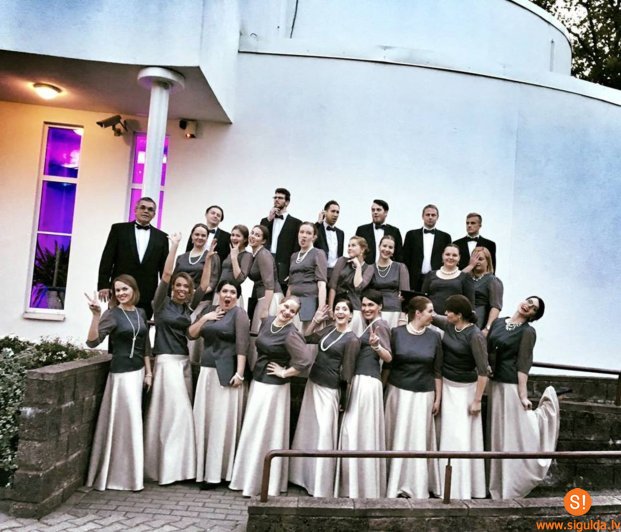The Sema ceremony accompanied by a cappella and the reed flute – Ney
The unique symphony of the ancient Sema, magic of singing and charming sounds of the reed flute.
In 2005 UNESCO proclaimed the Sema ceremony a Masterpiece within the framework of the UNESCO Masterpieces of the Oral and Intangible Cultural Heritage. This ritual has become well known all over the world. Many a one people come in December to its land of origin Konya (Turkey), to see the Big Sema ceremony and to touch with their inner mystery.
This year, for the first time in the world, within the framework of the V international festival of oriental music “RUMI FEST”, Latvian land will give home to the Sema ceremony, with all its canonic contours. The ceremony will be demonstrated to a wide audience accompanied by an unconventional tune – the role of musicians will be given to the Latvian mixed choir “ATVARS”. An exclusive musical instrument, which will sound during the ceremony, is the Ney, symbolizing us as conductors of Divine idea, seeking and striving for love, for returning to ourselves. The Ney play will be performed by one of the best world’s ney players – Mohammad Rasouli.
The mesmerizing view of whirling dervishes, the sound of the reed flute, the magic of voices – is an opportunity to dive into deep impressions, close one’s eyes and imagine oneself the centre of a huge universe with whirling galaxies.
About the point of the ceremony and its participants
The Mevlevi Sema ceremony. Sema, also Sama is a Sufi ritual. It includes singing, musical accompaniment, whirling, recitation of verses and prayers, wearing symbolic clothing. The ritual Sema appeared due to the inspirer of the Mevlevi Sufi order, a poet and a mystic Jalaluddin Rumi (Mevlana) and has been held since the moment of his death on 17 December, 1273. Rumi’s poems were translated to many languages of the world and read by people around the globe despite their nationalities and beliefs, because this poetry is a hymn of life, love, wisdom, humanism, transformation of a man into a Man, by design of the universe in all of us.
According to the legend, once Rumi heard rhythmic sounds of goldbeater hammers in the city market. In a series of beats, made by apprentices during gold casting, he could hear zikr “La illaha illa Allah” (“There is no god except God”), which put him into the state of rage, he opened his arms wide and started whirling. The Sema ritual roots back to Persian and Turkish cultures and is associated with oriental traditions.
Sema is a rather complex ceremony. It consists of recitation of praise to the Prophet, musical improvisation and whirling, followed by the second part, consisting of four musical and whirling sections, called ‘selams´, which are finished with instrumental music and the Quran recitation and saying prayers.
In the beginning dervishes appear in conical felt hats, and in black cloaks; these cloaks are taken off during the dance and the dervishes stay in white clothing. Such change of clothing is interpreted as death and resurrection. Their movements, slow and dignified in the beginning, gradually accelerate in time with the music, but never become uncontrolled. In each of these musical sections the dervishes come up to a superior (sheikh) and having received his blessing start whirling, by revolving around their axis, each in his rhythm. They do not utter a sound, their hands and head remain static.
When a dervish whirls, his long skirt opens its folds like a white lily flower, but in fact it symbolizes a shroud for Ego, and a conical felt hat – its tomb stone. Doing the Sema, a dervish, or semazen, grows through the desert of his personal ego, ascending to Divine Love, and returns from his spiritual journey in a more mature and perfect state. The dervish does whirling by moving clockwise around the axis of his heart, as if he hugs with love and tenderness the whole world. Prior to beginning of whirling, he keeps his hands crossed upon the chest, as a sign of obedience to God, and then he opens his hands wide. The right palm is turned upwards to the sky, ready to receive a blessing, and the left palm – downwards to the earth, giving the blessing to it. The dervish turns into a conductor of Divine Grace.
The Sema will be performed by Mevlevi dervishes in Riga.
The Sigulda mixed choir “ATVARS”
The youth choir “ATVARS” was founded in 1993, as a choir at the Sigulda State Gymnasium. Back then it consisted of 45 gymnasium students and graduates. On 1 January, 2014 the choir “ATVARS” changed its status and now it is giving concerts under the umbrella of the Sigulda Centre of Culture . At present the choir casts 40 young singers not only from Sigulda, but also from Riga and other nearby towns.
The choir conductor and artistic director is Janis Baltinsh. J.Baltinsh arduously selects new interesting repertoire, compiles musical arrangements and instrumental accompaniment, repertoire, enthusiastically motivates choir members to reach new heights.
During its artistic life the choir gas participated in all Latvian and school song and dance festivals, became a laureate of choir singing competitions. The choir “ATVARS” regularly gives concerts in Sigulda vicinity and around Latvia. It participated at international competitions in Hungary, Estonia, Poland, Czech Republic and Lithuania, at many competitions in Latvia, and took honoured places in them.
At the 8th World Olympiad of Choirs, held in Riga in 2014, “ATVARS” won gold and silver.
In 2017 it won the 1st prize at the international competitions of choirs “KAUNAS CANTAT” (Lithuania) and received two golden awards.
In November, 2018, the choir “ATVARS” will celebrate its 25th anniversary. Its repertoire includes Latvian songs a cappella, arranged folk songs, songs for choirs by composers of different folks and nations, semi-orchestral compositions.
Mohammad Rasouli, one of the world’s best ney players, was born in 1972 in the North of Iran (Alburz mountains). He has been studying the Ney (Persian classical flute, the most difficult windy instrument in the world) since 1991 from Master Mehdi Ebrahimi. Graduated the Tehran Art University, Music University; learned Radif Davami vocal repertoire from Master Mohammadali Kiyaninejad and Radif Mirza Abdollah instrumental repertoire from Master Abdolnaghi Afsharniya.
After finishing his academic education he continued the music studies with masters Mohammad Ali Kiyaninejad and Hasan Kasai. He taught the Ney in different music schools of Tehran and Gorgan in Iran.
In 2004 Mohammad moved to Warsaw, and since then he has been giving many solo concerts and performing with other renowned artists, such as Alireza Javaheri, Bahman Rajabi, Bahram Sarang, Hooshang Farahani, Maria Pomianoska. He created a Persian-Polish ensemble, consisting of Persian and Polish musicians, in order to promote Persian music in Europe.
Mohammad Rasouli recorded some audio CDs of NEY Solo Persian classical music.
Moreover, he played ney as part of the soundtrack composed by most renowned Polish composers for Polish movies, such as “SZUKAŁEM WAS” (“I WAS LOOKING FOR YOU”), “WINO TRUSKAWKOWE” (“STRAWBERRY WINE”) and for the film “TRICK”.
Playing with different music bands and solo he took part in numerous musical festivals: Culture Festival, “Ethno Port”, “Song of Our Roots”, Tartu Early music festival in Estonia, Mystic music festival in Latvia, Jewish music festival in Warsaw, “EthnoKraków/ Rozstaje”, TOPtrendy music festival, “PERŁA BAROKU” (“BAROC’S PEARL”) and many others. He regularly gives concerts and workshops at Museum of Asia and Pacific (Warsaw).
Mohammad Rasouli played concerts in Iran, Poland, Lithuania, Latvia, Estonia, Austria, Germany, Switzerland, Italy, Great Britain and Japan. In Poland he played as a soloist with different Polish Philharmonic orchestras the composition “NEYNAVA” by Master Hossein Alizadeh (a composition for Ney and string orchestra). Performed with Philharmonic Orchestras different cities of Poland, Lithuania and Latvia.
He regularly gives workshops of Persian songs especially Sufi music songs, teaches technic of playing Ney and Radif, system of Persian classical music (Radif Davami) all over the world.



